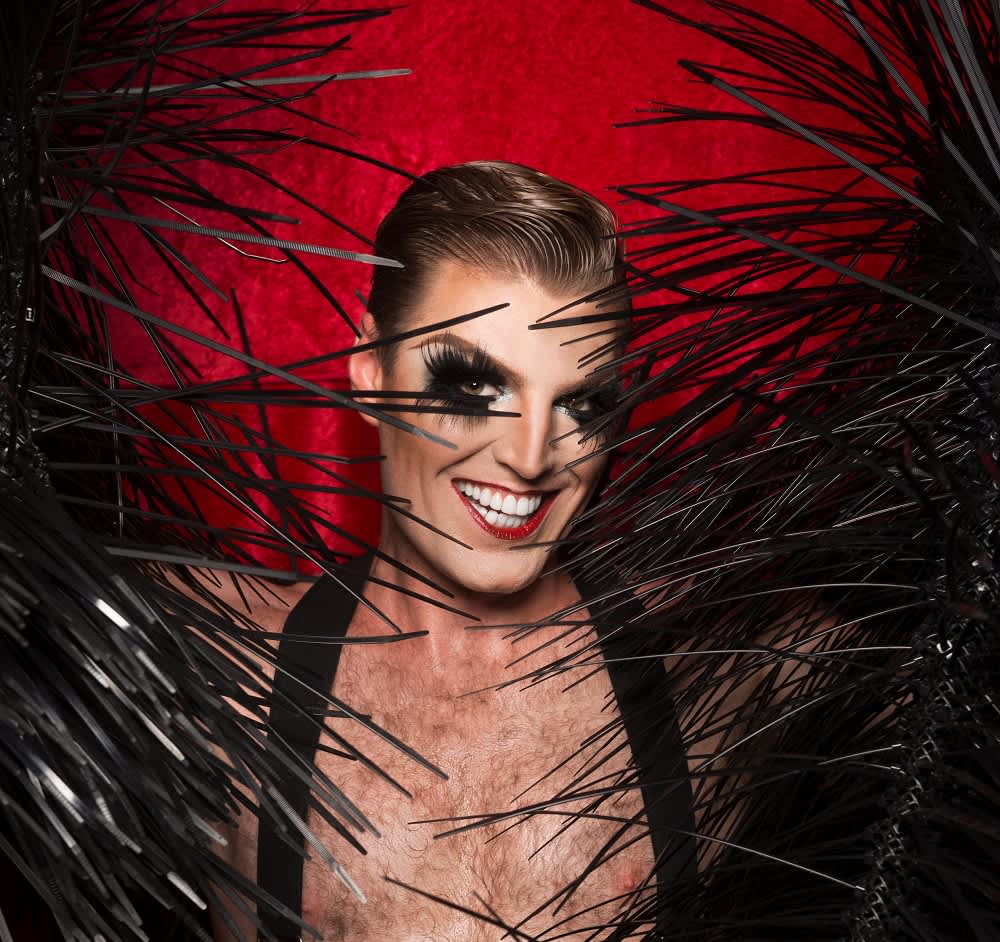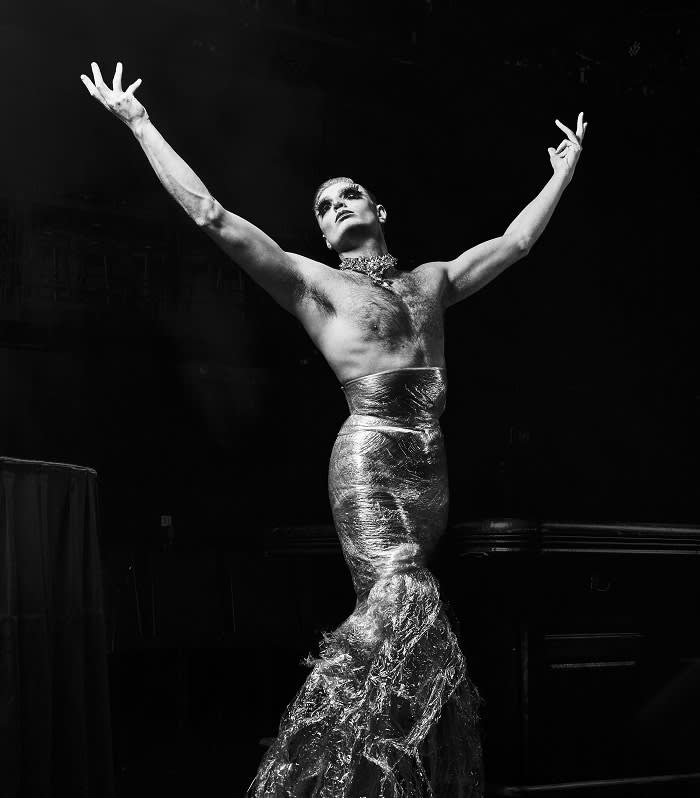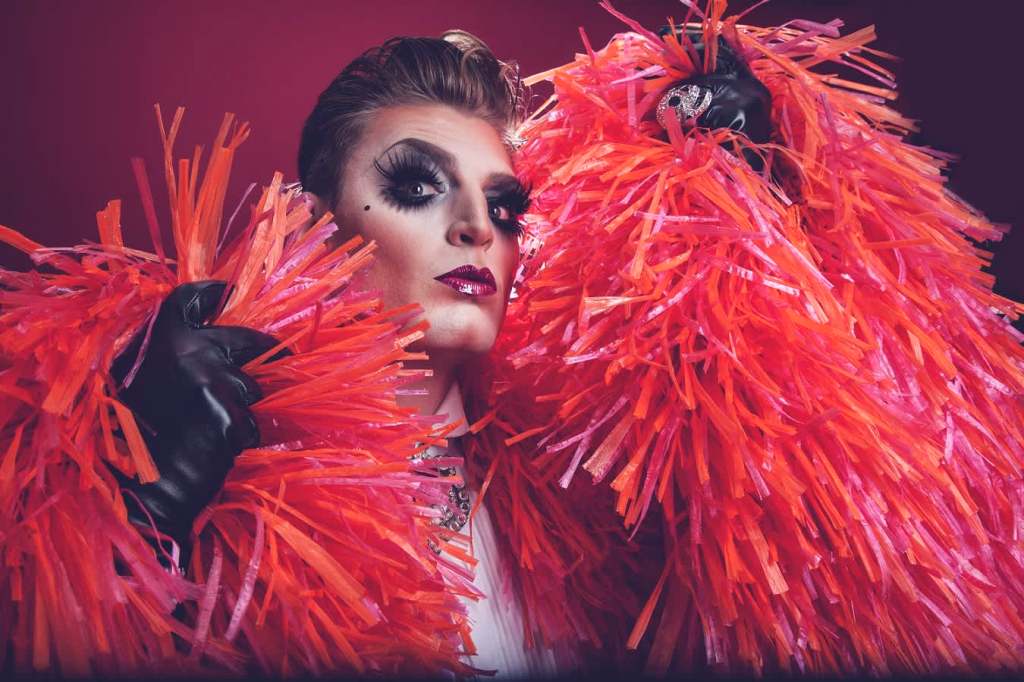Drag comedy sensation Reuben Kaye is back in Australia and storming the country on a nationwide tour peddling his unique brand of devilish sleaze and sass, the calibre of which we’ve not seen since the glory days of Dame Edna.
Kaye is an altogether different breed, with the kind of humour you wouldn’t be able to get away with on any daytime television show. It’s the type of act that disturbs and delights in equal measure and is bursting with so much energy it could be our next form of renewable power. Think Dr Frankenfurter from Rocky Horror Picture Show with the comedy chops of Jim Carey and the acerbic wit of Tim Minchin and you’re halfway there.
Coming out is never an easy thing to do for anyone. As Kaye points out to us, it’s a bit of a weird event to have to go through at all. No straight person has to declare that they’re sexually attracted to the opposite gender and most people are pretty uncomfortable talking about sex at all with their parents, never mind their sexuality.
Kaye himself had a rather rough time as a young gay man with few, if any, personal allies or role models to look up to. He describes his own coming out, at the age of 14, as “difficult” and he spoke beautifully and openly with us on how to talk to your kids about sexuality, identity, and coming out.
*CW: This article mentions homophobia, violence, and suicide.
The Latch: Hi Reuben! Thanks so much for sharing your story with us today. Tell us, what was your own coming out like?
Reuben Kaye: I had all the ingredients for it to be an easy coming out. I had really artistic parents, a really artistic family, we were raised with gay men in our lives as benevolence forces.
My mum and my stepdad couldn’t give a shit. Their reactions were kind of ‘Okay, that’s great’. Mum’s exact reaction was: “I don’t know why you think I’m interested. Who you sleep with is none of my business. Just like who I sleep with is none of your business”.
I asked her who she was sleeping with and she said “none of your business”. But that didn’t stop the fact that I was terrified. I was scared of rejection because a child just wants to be loved by their parents.
My dad had this reaction which was motivated by his own trauma and his own fear because he was raised in a family of Holocaust survivors who viewed children as a continuation of the line. So when I said I was gay, his first leap was, you’ll never have children, you’ll never be a father, and that means that I failed as a father to you.
It was a lot, and even though the next day or the next time I saw him he was supportive and wonderful, that moment sort of sent this electric jolt through my body and it defined our relationship, in my mind, for at least the next 10 years.
It wasn’t until he got diagnosed with cancer that I sat down and said “All right, there’s no more time for bullshit. Let’s have it all out in the open”. We had to really push through it because, when a child is coming out to their parents, really what they’re saying is “Am I okay?”.
TL: That sounds really challenging. What was it like being out at school?
RK: I was pretty badly bullied at school. I was hospitalised multiple times. My school didn’t really know what to do so they put me on their version of suicide watch and told me that I needed to tone down my behaviour.
The only time I remember them taking proper action was when there was a witness to these boys like throwing me into oncoming traffic on the school’s main road.
School was sh*thouse. And I went to a nice school. I went to a school that now has a fantastic reputation. So this is not about the classist idea that prejudice and bullying exist only in working-class or underfunded or rural schools. This was a wealthy, white-majority, inner-city school.
I think I’ve actually done quite a good job of processing it, which I’m happy about. I do feel that, as gay men, we all have that labour ahead of us when we have this stuff happens.
It’s like, “Great, I’ve got to spend about 10 years of my adulthood unpacking this, trying to accept or forgive people for it”.
What I found interesting was when I went to my high school reunion, all these guys came up and apologised to me, which was so beautiful and moving. It was proof that the people who commit these acts of prejudice, violence, or homophobia, hang on to the trauma of being a bully as much as the victims.
Remember, we’re never fully formed humans in high school. We’re all just in survival mode, trying to learn how to be.
Those guys said to me, “Look, I’ve got kids now, and if anyone did to them what I did to you, I’d murder them, I’d kill them”. They hold on to that stuff, as much as we hold onto our own pain.

TL: That must have been a really big moment. Is it easier now?
RK: There’s so much more representation in the media. That’s a huge thing. It’s massive. It can’t be understated how important it is to have positive representation in mainstream media.
I went to my primary school recently to speak and there were out teachers, there were programmes, there was awareness and respect. There these groups that advocate and spread awareness and make sure that there’s someone to talk to if people need it. That’s happening in sport, that’s happening in education and in schools, so there is absolutely a huge shift.
My representation when I was younger was Ursula from The Little Mermaid and Scar from The Lion King. They were some of the only queer people in 1998. I think Will and Grace hadn’t even been on the air. You’re talking about that level. There was no real representation beyond queer villains.
Disney, a child’s entertainment company, would only make their villains camp because the only way that campness could be legitimised was if it was sinister. That’s how they view villainy, as feminine, as predatory, but at the same time, fabulous.
As a kid, I can probably see why other kids couldn’t relate to me. I was very foreign. I was essentially like Scar as a 10-year-old boy.
TL: Knowing what you know now, how do you think we should talk to kids about coming out?
RK: Any child will always be apprehensive to come out because of the amount of societal stigma.
Make sure that your child feels safe, and knows that they can talk to you. Create a safe space for your child and an open level of communication.
That’s just part of being a good parent. It isn’t even related to a child’s need to come out, it’s related to a child’s need to tell you anything.
You can’t ever rush someone’s coming out either. Coming out is intense and it’s an internal processes as much as it is an external process.
It always feels a bit like entrapment, if you’re starting to try and make sure that they have reading material, or watching queer things on TV with them.
If the parent is interested in the things that their child is interested in and has an open bond of communication, then the child should be able to feel like they can tell them anything.
My parents talked to me very openly about sex. So, I was like one of the only preschoolers who knew what a blowjob was. That may have been possibly detrimental to my development but I was very popular in college.
Definitely talk to your kids about sex and be matter of fact about it. Make sure that your kids know that you don’t, as a parent, put pressure on them to be anything or to do anything. Don’t stigmatise sex for them. There’s already going to be societal stigma, possibly stigma from the school, if they’re going to a religious school.

TL: Thank you for sharing that. What’s the next step?
RK: My advice would be on after the child comes out, how you react to them. Like I said, my dad’s reaction was entirely self-motivated. He thought of himself almost automatically.
As a parent of an obviously gay child, it shouldn’t have been a surprise. My mum and my stepdad were like, “Well, duh” but for some reason, for dad, it hadn’t entered into his thoughts. He thought it meant that I would never have children, and that meant that he included all of his trauma.
You just have to understand that the kid is trying to ask if you still love them. Is there something wrong with me? Am I okay? It’s about reassuring them and putting yourself and your own worries aside. In that moment, you have to be a parent instead of a person. The child also has to understand that you are a person and not a parent which is really difficult because, as a child, you’re not meant to understand your parents as people, that’s not your job. But I had to.
I’ve come to accept that my dad’s reaction, at that moment, was not his true reaction. It was motivated by his experiences and his own life. That was something I had to expand and stop being a son, to think of my dad as a human.
TL: When’s the right time to talk?
RK: I think the most appropriate age to start talking about these topics is when the child asks. Some kids at four years old ask “Where do babies come from?” That doesn’t mean you have to go into complete medical detail, but you can be matter of fact.
Children are smart, we have really high bullshIt detectors as humans and as children, especially, I think we can definitely sense when our parents are not giving us the whole picture.
Five-year-olds know how to work an iPad. This means that a five-year-old can access porn. So, why not just debunk it all and take the mystery out of it by just being as open, as factual, and as true as you think is needed, as a parent.
What are kids going to do otherwise? Ask other kids? I don’t think we want kids asking other kids about sex because they’re just never gonna get it. My mum was very open, very factual about everything. Sex never really had mystery which was great.
If you don’t talk to them, that probably makes them more prone to risk risky situations because they’re still exploring and their parent hasn’t given them the tools to assess risk properly.
TL: In today’s society, is coming out still necessary?
RK: There’s a lot of talk about coming out as unnecessary, or coming out itself as a symptom of homophobia, as a symptom of societal pressure, which is true.
The only reason we need to come out is because being gay is seen as something outside the norm. Not necessarily bad or, or villainous, but outside the norm, something that needs to be revealed.
It would be nice if coming out didn’t have to happen. But I also think coming out has real value as an internal process. Because it is one thing to be seen by others, but to see yourself, to plant a flag and claim it as your own is a huge part of your own self-determination.
One of the reasons why coming out is important, as an external situation, is because it’s about self-defining. Because, up until then, your friends, your family, your loved ones; they’re the things that have defined you. So it’s you taking a step as yourself.
Catch Reuben Kaye Live
Reuben Kaye is currently touring a solo and a circus show around Australia.
He’s playing at The Tivoli Theatre in Brisbane, The North Australian Festival of Art in Townsville, and, later in the year, Darwin, and Perth.
Reuben says he’s got plans in the works for another season in Sydney soon so watch this space.
If you or anyone you know is struggling and needs support, call Kids Helpline on 1800 55 1800 or Lifeline on 13 11 14, both of which provide trained counsellors you can talk with 24/7. You can also speak with someone confidentially at Headspace by calling 1800 650 890 or chat online here.







